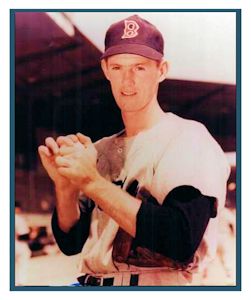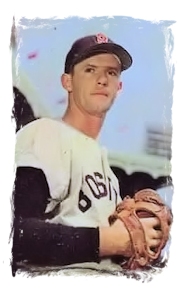|
“FENWAY'S BEST PLAYERS”  |
|||||
Maurice McDermott Jr was born on April 29, 1929, in Poughkeepsie, N.Y. At 13, Mickey went to his first baseball tryout camp, held by the Brooklyn Dodgers in Newburgh, New York. Pitching for St. Patrick’s High School in Elizabeth, New Jersey, he set Catholic Conference marks, averaging 20 strikeouts per game. Against St. John’s Academy, he struck out 27 batters which was a particularly remarkable achievement given that regulation games were seven innings long and not a full nine. Mickey pitched for the Ferrara Trucking Company team, facing other semipro teams and, at times, major leaguers playing under aliases. He earned $50 to $75 per contest. In 1944, McDermott Sr. doctored Mickey’s birth certificate, making the 15-year-old appear a year older. The Red Sox were very interested and manager Joe Cronin did learn of the father’s scam. The two men arrived at a final resolution and Mickey’s arm earned $5,000. The Sox got a sure phenom, or so they thought. Mickey was immediately sent to the Red Sox’ Eastern League farm club, the Scranton Miners. In July 1946, he threw his first professional no-hitter, against the Pittsburgh Pirates’ Eastern League outfit, the Albany Senators. He completed the year 16-6, with a 3.29 ERA. Scranton dominated the Eastern League, defeated the Wilkes-Barre Barons in the playoff semifinals and swept the Hartford Chiefs to win the Governors’ Cup. In 1947 he was promoted to Boston’s Triple-A affiliate in Louisville but control problems led him back to Scranton. With the Keystone State he found the strike zone. He notched a 12-4 record with four shutouts, a 2.86 ERA, and a league-leading 136 strikeouts. In a postseason contest at home against the Utica Blue Sox, Mickey pitched his second Eastern League no-hitter. In the top half of the ninth however, future Philadelphia Phillies legend Richie Ashburn walked and advanced to second on a fielder’s choice. Ashburn got to third on a fly ball and scored the game’s only run on a passed ball. Mickey was tagged with the no-hit loss. Mickey moved onto the 1948 Red Sox roster and maneuvered into the media matrix of the day. In April 1948, he made his major league debut, a relief effort in Yankee Stadium. He appeared in seven games that year. Three months into the season he had pitched 23 1/3 innings, but walked 35 and was sent back to Scranton. Disappointed with the move, Mickey adjusted and gained more control, averaging 13 strikeouts a game. In September 1948, in the Eastern League playoffs, he threw his third no-hitter, an 8-0 victory over Utica. He was recalled to the Red Sox but did not pitch in September. For the 1949 season he was assigned to the Triple A, Louisville Colonels. In May, he fanned 20 St. Paul Saints, setting an American Association record that would never be broken. In the following four games, Mickey kept throwing K’s and established another milestone: the most strikeouts over a five-game set, 93. The Sox called him up and completed 1949 with a 5-4 record, including two shutouts, and with the world on a string. He was dubbed the new messiah who would lead the Red Sox not just to the pennant but to the World Series as well. He already had fan clubs. Women clamored for his autograph and affection. He simply was a man-about-town, a bon vivant, a nightclubber and lounge singer who happened to be a rising Red Sox star. From 1950 to 1952, the free-spirited Mickey partied, drank, enjoyed his multiple female companions. He made singing gigs whether at Steuben’s in Boston or at Grossinger’s in the Catskills. His annual baseball salary was around $7,500 and his music act commanded $500 weekly. 1953 was a zenith year on the diamond. In April at Briggs Stadium, Mickey garnered his second win of the year by holding the Detroit Tigers to three hits in a 2-0 shutout. Back in Boston, he tossed a two-hitter, shutting down the Indians, 1-0. In August, he got his 12th victory in a 10-inning contest, edging the Athletics 3-2. He also performed at the plate with two hits, with a single in the 10th and scoring from second. Mickey went 18-10 in 1953, but late in the season some off-the-field incidents made him a marked man. He slugged a sportswriter and soon after that used foul language in front of Tom Yawkey’s wife, Jean outside Fenway Park. In December 1953, he was exiled from the first tier of the major leagues to baseball Siberia. The Red Sox traded him to the Washington Senators to obtain Jackie Jensen. In August 1961, Mickey appeared in his last major league game. In August, the A’s pink-slipped him and no other MLB club sought his services. Every major league team that selected Mickey had done so in the hopes he would blossom into their ace given his talent but now the project was over. In 1968, the California Angels hired him as an assistant coach and batting practice pitcher but he was gone after the 1969 season. He tried his hand at running a bar but drank up any profits. His poor health, legal problems due to numerous DWIs, and the lottery victory all combined to help keep him sober for the remainder of his life, but on August 7, 2003 Mickey McDermott died in Phoenix, at age 74, of congestive heart failure and colon cancer.

|
|||||
